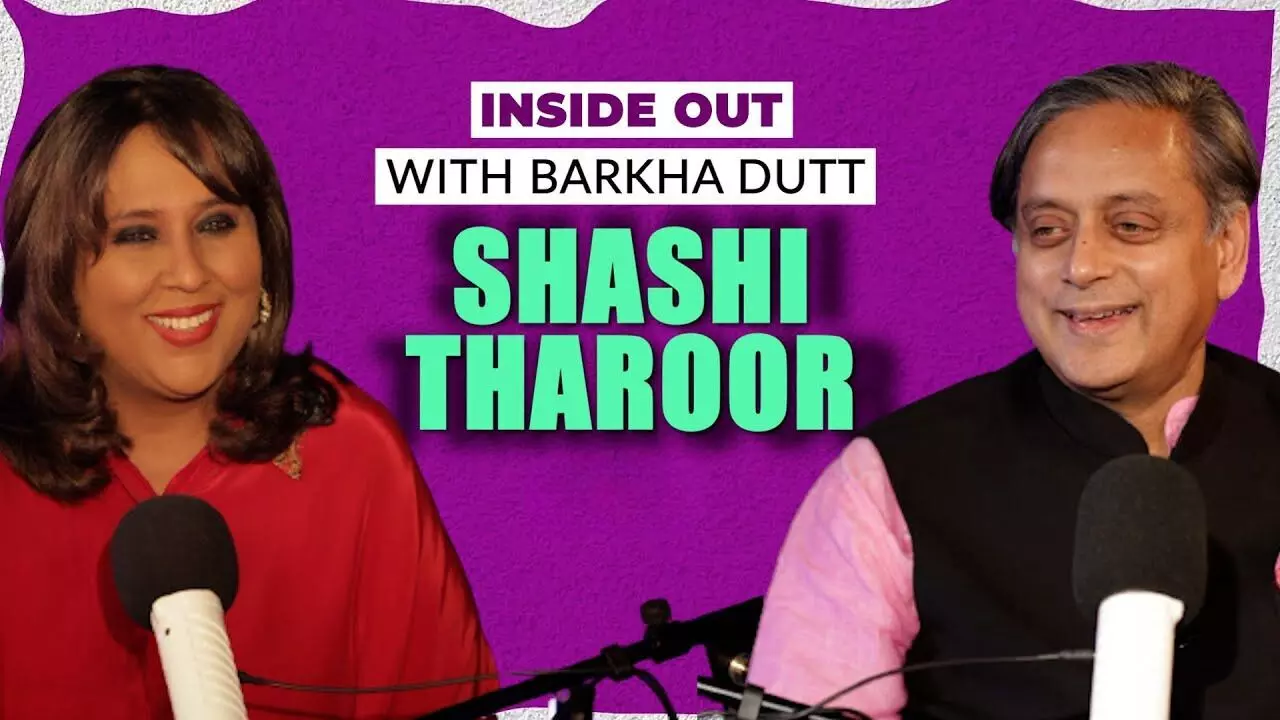Shashi Tharoor on feeling "uncertain" about his future I Inside Out with Barkha Dutt
Barkha Dutt sits down with Shashi Tharoor for his most personal conversation yet. From addressing the trauma of being falsely accused of murder to reflecting on his political journey, personal challenges, and the word “uncertain” that defines his current state of mind, Tharoor offers a candid glimpse into his life. A compelling hour of revelations and resilience you won’t want to miss.
In a candid conversation on the podcast Inside Out, Shashi Tharoor opened up about his personal and professional journey, reflecting on identity, politics, resilience, and the unexpected twists of his life. The discussion, led by journalist Barkha Dutt, offered an unfiltered glimpse into the life of one of India’s most eloquent and controversial public figures.
Tharoor, born in London, began by addressing his enduring sense of Indian identity. “I may have been born in Britain, but when I look at myself in the mirror, I see an Indian,” he said, describing how his family’s values shaped him. His father, a journalist, moved to England for work but always intended to return to India. “He never saw himself as a permanent migrant. He was waiting for an opportunity to come back home, and when it came, he took it without hesitation. That mindset influenced me profoundly.”
Tharoor, whose oratory and extensive vocabulary have become his trademark, reflected on the public’s fascination with his language. “The whole ‘big words’ thing started after I used ‘farrago’ on TV, accusing a certain anchor of spreading a farrago of distortions. Within an hour, the Oxford English Dictionary tweeted that they’d never seen so many Indians looking up a word at once.” Tharoor laughed as he recalled the incident but emphasized, “Language, for me, is about communication. I speak how I’ve always spoken—not to intimidate, but to connect.”
When asked about the most challenging chapter of his life, Tharoor spoke at length about the aftermath of his wife Sunanda Pushkar’s tragic death. “It was shocking to be accused of something so heinous,” he admitted, recounting how rumours and falsehoods spread rapidly. “There were incredible lies—claims of hitmen, Russian poison, even absurd accusations about secret meetings. I knew I had done nothing wrong, but the burden of proving one’s innocence in a trial-by-media environment is crushing.”
He credited Sunanda’s family for standing by him. “Her brothers and her son knew me, knew our relationship, and supported me without hesitation. That gave me strength.” Despite the ordeal, Tharoor refused to let the accusations define him. “When the sharks bite you, do not bleed,” he said, quoting a Ghanaian proverb shared by former UN Secretary-General Kofi Annan. “I realized I couldn’t give my critics the satisfaction of seeing me crumble.”
Tharoor immersed himself in his work during those tumultuous years. “I kept writing and speaking, refusing to let others dictate how I should live my life. One of my proudest moments, the Oxford Union speech, happened just a year after Sunanda’s passing. It showed the world that I was still standing and still had something to say.”
Reflecting on his political journey, Tharoor recalled his first electoral campaign in 2009, where his opponents questioned his ability to represent his constituency in Kerala. “They said, ‘He doesn’t even speak proper Malayalam.’ I told them, ‘I speak enough to understand your problems and, more importantly, to articulate them in Delhi, where it matters.’ That resonated with the voters.” Since then, he has won three consecutive terms as a Member of Parliament, often balancing local issues with his global profile.
On his alignment with the Congress party, Tharoor shared, “I instinctively share its values. Even when I think differently on issues like economics, the Congress has always been a big tent for diverse views. It’s where I feel most at home.” However, he admitted to being at a crossroads about his political future. “Do I have the fire in the belly to contest a fourth term? Or is it time to focus on writing, something that has always meant so much to me? These are the questions I’m asking myself.”
The conversation also touched on his illustrious career at the United Nations, where he served for nearly three decades. From managing refugee crises to running peacekeeping operations in conflict zones, Tharoor reflected on the challenges and rewards of working on the global stage. “One of the most formative experiences was during the boat people crisis in Singapore. We had overflowing refugee camps, and I had to find creative solutions, often bending rules to ensure people’s safety and dignity. It brought out the best in me.”
Tharoor also addressed his close but unsuccessful bid for the position of UN Secretary-General. “I was probably the most prepared candidate ever, having worked in every key area the job required. But the role isn’t given based on merit alone—it’s a political decision, and the Americans had made up their minds against me. It was a bitter pill to swallow but a valuable lesson in understanding the realities of global politics.”
Toward the end of the conversation, Tharoor described his current state of mind with a single word: “uncertain.” He elaborated, “It’s not just about politics. It’s about figuring out what I want for myself—whether to keep pushing forward in public life or to step back and dedicate myself fully to writing. There’s a certain freedom in not knowing.”
Tharoor’s reflections revealed a man deeply aware of his triumphs and failures, his joys and sorrows. Whether discussing the trauma of public accusations or his lifelong love for language, he offered a portrait of resilience and intellectual depth. For a public figure often seen through the lens of politics and controversy, this conversation highlighted the complexities of a life lived with passion and purpose.


